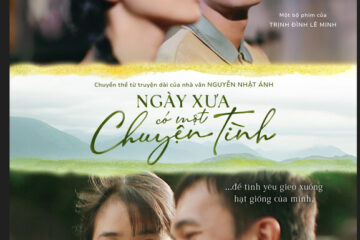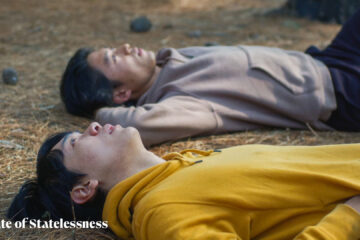Interviewee: Tuong Vi Nguyen Long, director of Let There Be Work
Interviewer: Xiangu Qi
Let There Be Work, directed by Tuong Vi Nguyen Long, is a unique documentary that turns its focus towards white-collar work in Vietnam. It documents how the employees of a non-hierarchical, Vietnam-based IT company organize themselves and find their own paths through a variety of meetings, conversations, and group activities inside and outside their workplace. In this interview, we spoke with Tuong Vi Nguyen Long about her inspirations, her approach to engaging with the documented subjects, her deliberate choice to keep herself (as director) off-screen, and the struggles and surprises she encountered along the way.
Your documentary centers on a non-hierarchical IT company run by Vietnamese employees in Saigon. What drew you to this subject, and what key themes were you hoping to explore through the film?
When I was a kid, I saw my father come back home from his work, sad and exhausted, even if he loved his job. He felt lonely, forced to work harder and harder by his boss, and never be congratulated for his skills. So, I grew up with the idea that I would not work for a company. Hence, I became an editor and a director, free to choose my schedule and the people I want to work with, looking at the “poor people bounded forever at their jail”. But one day, I met the founder of Officience – who championed how employees of their company worked together without hierarchy. Individual growth and solidarity are the two subjects that interested me for a while. I thus decided to go to Vietnam and check Officience operated. Moreover, Officience is a company based in Vietnam but founded by a French Việt Kiều (a term for the Vietnamese diaspora). It would allow me to explore the convergence and/or divergence between Vietnamese culture and French Việt Kiều culture from a new perspective –not the family bond I used to examine, but the economic and political associations.
The company has attracted hundreds of Vietnamese workers. How did you decide which individual stories to highlight in the film?
When I arrived in Vietnam and asked the employees for permission to make a documentary about their life in the company, they accepted immediately. I got the permission to go everywhere, whenever I wanted. The real challenge was that I did not want to do interviews or to use voice-over to explain the organization of Officience. I wanted to document how it feels to work there, especially for employees who have to find their own paths independently. So, I spent a lot of time getting a sense of the employee-led activities around me. What I did was just to ask to join meetings and talk to people.
In doing so, the main subjects that the employees regularly focused on became clearer themselves, from my point of view. Therefore, I decided to just follow the cues and open myself to anything that is out there: Vietnam’s economic development, individual growth, and solidarity.
The film includes many scenes of meetings and internal discussions. What guided your selection of these moments, and how did you ensure a diversity of perspectives and situations in the conversations depicted?
It is very hard to explain the organization of Officience if there are not interviews and voice-over, so I decided to observe how the employees present the company and themselves during extracurricular events, and how they explain their organization system to the interns who freshly arrived. Once I understood the administration structure of Officience and the way the employees organize themselves, the main goal of my project became to ensure the diversity of what is documented.
So, I joined different meetings where there were a lot of employees debating a decision. It allowed me to discover what happens when people have different opinions in these settings. Following these meetings, I talked with some employees about their feelings, their positions in the company, the important parts of their job, and even some personal preoccupations, all of which guided me towards new thoughts.
You chose to remain absent on-screen. What motivated that decision, and how do you think it shaped the documentary’s tone or its thematic direction?
I kept myself off-screen to give more room to the documented subjects, trying not to influence the spectator with my own opinions. The documentary does not present a neutral position. It is more a reflection on the economical and historical context than an opinion about the organization of Officience. I was interested in how a company like Officience makes its place in Vietnam and how Vietnam manages the social transformations caused by the fast economic growth in the last decade. The documentary’s tone is a mix of hope, incredulity, and a confrontation with reality.
Rather than imposing a judgment, the film presents the company’s missions, ideals, and potential challenges without overt commentary. Why did you choose this observational approach?
It is very valuable to see the workers empower themselves, searching for equality in the globalized world. That is what I wanted to convey, not in words, but in a cinematographic way. In addition, I preferred no intervention from the private life of Officience employees, as the film is a documentary of the company. Moreover, I wanted to allow audiences to make their own paths through watching the film. For myself, moviegoing is a way to explore my inner world. When nobody tells me what to do, I always lead myself to think how I would react if I were in a certain situation. This mindset nourishes my empathy for the subjects of the film. Cultivating empathy is an exciting mission for me.
How long did the project take to complete? What was your process for building trust and collaborating with the company and its employees? Were there any particularly challenging or rewarding moments during production?
I spent six years making this film, even though the employees trusted me the entire time and allowed me to ask any question I wanted. It took time to meet people, to understand what they do, their dreams and expectations, and to build connections. I also needed to do fundraising since I did not have enough money to travel to Vietnam whenever I wanted.
For instance, Officience relocated in 2017, but, sadly, I did not get the chance to have a look at the new building construction. However, I kept conducting online discussions with the employees, which allowed me to show my interests regardless of the distance. In documentary-making, missing something important is not good, but it happens all the time. I am still learning how to deal with it. However, surprises also come along.
The documentary ends with the city’s night view glittering with flowing lights and vibrant colors, adding a dreamlike quality to the film’s otherwise realistic aesthetic. What inspired you to choose this as the closing scene, and what meaning or feeling were you hoping to leave the audience with?
The final sequence shows the students in Đà Nẵng preparing their dinner. I wanted the audience to meditate about their future, full of hope and passion – which is nourished by their social background. What will our lives be like tomorrow morning? This question leads me to conclude the film with nostalgia from both an individual perspective and a collective perspective. The music of Nodey’s “Sous la pluie” is a perfect illustration of this, since it is a remix of an old Vietnamese song.
Let There Be Work will be shown on Viet Film Fest 2025’s virtual platform and will be available there from October 4-19.


